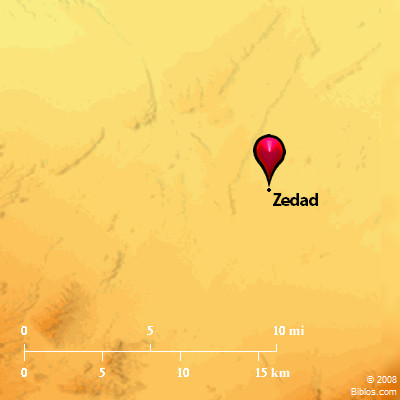Atlas  Zobah (Zedad) and surrounding area Maps Created using Biblemapper 3.0 Additional data from OpenBible.info You are free to use up to 50 Biblos coprighted maps (small or large) for your website or presentation. Please credit Biblos.com. Occurrences 1 Samuel 14:47 Now when Saul had taken the kingdom over Israel, he fought against all his enemies on every side, against Moab, and against the children of Ammon, and against Edom, and against the kings of Zobah, and against the Philistines: and wherever he turned himself, he put them to the worse.2 Samuel 8:3 David struck also Hadadezer the son of Rehob, king of Zobah, as he went to recover his dominion at the River. 2 Samuel 8:5 When the Syrians of Damascus came to help Hadadezer king of Zobah, David struck of the Syrians two and twenty thousand men. 2 Samuel 8:12 of Syria, and of Moab, and of the children of Ammon, and of the Philistines, and of Amalek, and of the spoil of Hadadezer, son of Rehob, king of Zobah. 2 Samuel 10:6 When the children of Ammon saw that they were become odious to David, the children of Ammon sent and hired the Syrians of Beth Rehob, and the Syrians of Zobah, twenty thousand footmen, and the king of Maacah with one thousand men, and the men of Tob twelve thousand men. 2 Samuel 10:8 The children of Ammon came out, and put the battle in array at the entrance of the gate: and the Syrians of Zobah and of Rehob, and the men of Tob and Maacah, were by themselves in the field. 2 Samuel 23:36 Igal the son of Nathan of Zobah, Bani the Gadite, 1 Kings 11:23 God raised up another adversary to him, Rezon the son of Eliada, who had fled from his lord Hadadezer king of Zobah. 1 Chronicles 18:5 When the Syrians of Damascus came to help Hadadezer king of Zobah, David struck of the Syrians twenty-two thousand men. 1 Chronicles 18:9 When Tou king of Hamath heard that David had struck all the army of Hadadezer king of Zobah, 1 Chronicles 19:6 When the children of Ammon saw that they had made themselves odious to David, Hanun and the children of Ammon sent one thousand talents of silver to hire them chariots and horsemen out of Mesopotamia, and out of Arammaacah, and out of Zobah. Encyclopedia ZOBAHzo'-ba (tsobhah; Souba): The name is derived by Halevy from zehobhah as referring to its supplies of "bright yellow" brass; but this word might be more appropriately used to contrast its cornfields with white Lebanon. Zobah was an Aramean kingdom of which we have the first notice in Saul's wars (1 Samuel 14:47). Strong's Hebrew H6678: Tsoba or Tsobahan Aramean (Syrian) kingdom |



